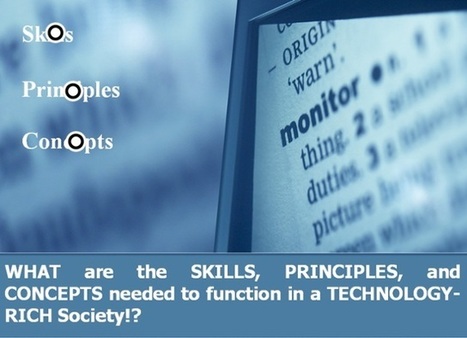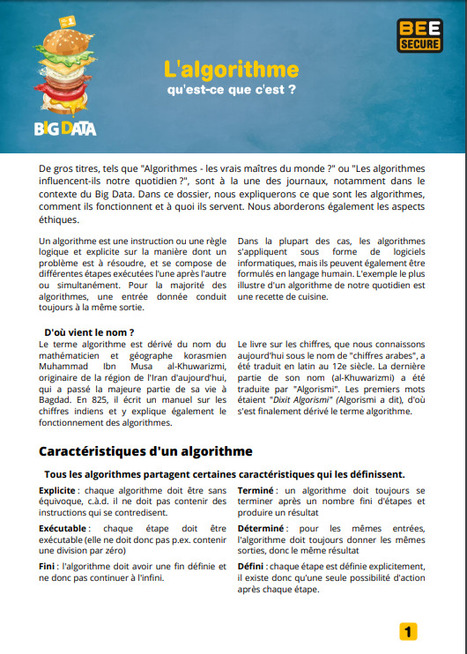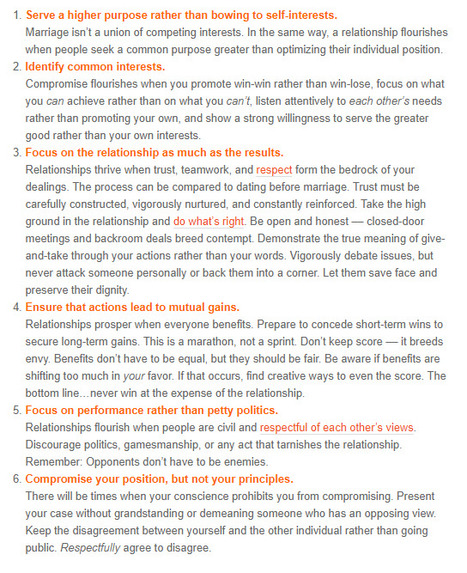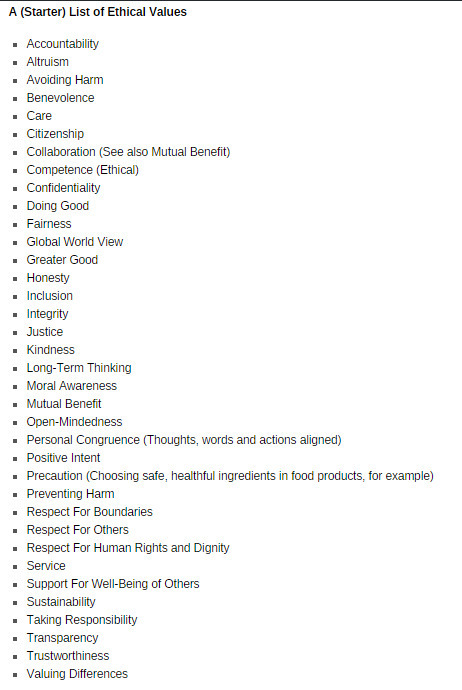 Your new post is loading...
 Your new post is loading...

|
Scooped by
Gust MEES
April 28, 2018 5:27 PM
|
As you might expect, Brin expects Alphabet and others to find more uses for AI. But he also acknowledges that the technology brings possible downsides. “Such powerful tools also bring with them new questions and responsibilities,” he writes.
AI tools might change the nature and number of jobs, or be used to manipulate people, Brin says—a line that may prompt readers to think of concerns around political manipulation on Facebook. Safety worries range from “fears of sci-fi style sentience to the more near-term questions such as validating the performance of self-driving cars,” Brin writes.
All that might sound like a lot for Google and the tech industry to contemplate while also working at full speed to squeeze profits from new AI technology. Even some Google employees aren’t sure the company is on the right track—thousands signed a letter protesting the company’s contract with the Pentagon to apply machine learning to video from drones. Learn more / En savoir plus / Mehr erfahren: https://www.scoop.it/t/21st-century-learning-and-teaching/?&tag=AI https://www.scoop.it/t/21st-century-learning-and-teaching/?&tag=Ethics

|
Scooped by
Gust MEES
September 13, 2017 10:21 AM
|
Preparing a child for the world that doesn’t yet exist is not an easy task for any teacher. Step back and look at that picture from a broad perspective. What are the critical 21st-century skills every learner needs to survive and succeed in our world? What abilities and traits will serve them in a time that’s changing and developing so rapidly?
They want to be challenged and inspired in their learning. They want to collaborate and work with their peers. They want to incorporate the technology they love into their classroom experiences as much as they can. In short, they have just as high a set of expectations of their educators as their educators have of them.
How Are Educators Responding?
The Australian Curriculum Assessment and Reporting Authority, (ACARA), have identified the following as the General Capabilities they see as essential for learners:
Critical and creative thinking
Personal and social capability
Ethical understanding
Intercultural understanding
Information and communication technology capability
Literacy
Numeracy
Learn more / En savoir plus / Mehr erfahren. http://www.scoop.it/t/21st-century-learning-and-teaching/?&tag=modern-education

|
Scooped by
Gust MEES
January 26, 2017 3:42 PM
|
Pro Bono Publico is also used in the United Kingdom to describe the central motivation of large organizations such as the National Health Service, and various NGOs, which exist "for the public good", rather than for shareholder profit but it equally or even more applies to the private sector where professionals like lawyers, bankers offer their specialist skills for the benefit of community or NGOs.
Pro bono publico (English: for the public good; usually shortened to pro bono) is a Latin phrase for professional work undertaken voluntarily and without payment. Unlike traditional volunteerism, it is service that uses the specific skills of professionals to provide services to those who are unable to afford them.
Pro Bono Publico is also used in the United Kingdom to describe the central motivation of large organizations such as the National Health Service, and various NGOs, which exist "for the public good", rather than for shareholder profit but it equally or even more applies to the private sector where professionals like lawyers, bankers offer their specialist skills for the benefit of community or NGOs. Learn more / En savoir plus / Mehr erfahren: http://www.scoop.it/t/21st-century-learning-and-teaching/?tag=Ethics

|
Scooped by
Gust MEES
October 22, 2016 3:56 PM
|

|
Scooped by
Gust MEES
June 1, 2016 2:44 PM
|

|
Scooped by
Gust MEES
August 11, 2015 7:48 AM
|

|
Scooped by
Gust MEES
March 27, 2014 11:17 AM
|
TOUCH this image to discover its story. Image tagging powered by ThingLink
Learn more:
|

|
Scooped by
Gust MEES
February 13, 2018 3:09 PM
|
De gros titres, tels que "Algorithmes - les vrais maîtres du monde ?" ou "Les algorithmes influencent-ils notre quotidien ?", sont à la une des journaux, notamment dans le contexte du Big Data. Dans ce dossier, nous expliquerons ce que sont les algorithmes, comment ils fonctionnent et à quoi ils servent. Nous aborderons également les aspects éthiques.
Un algorithme est une instruction ou une règle logique et explicite sur la manière dont un problème est à résoudre, et se compose de différentes étapes exécutées l'une après l'autre ou simultanément. Pour la majorité des algorithmes, une entrée donnée conduit toujours à la même sortie. Dans la plupart des cas, les algorithmes s'appliquent sous forme de logiciels informatiques, mais ils peuvent également être formulés en langage humain. L'exemple le plus illustre d'un algorithme de notre quotidien est une recette de cuisine.
D'où vient le nom ?
Le terme algorithme est dérivé du nom du mathématicien et géographe korasmien Muhammad Ibn Musa al-Khuwarizmi, originaire de la région de l'Iran d'aujourd'hui, qui a passé la majeure partie de sa vie à Bagdad. En 825, il écrit un manuel sur les chiffres indiens et y explique également le fonctionnement des algorithmes. Le livre sur les chiffres, que nous connaissons aujourd'hui sous le nom de "chiffres arabes", a été traduit en latin au 12e siècle. La dernière partie de son nom (al-Khuwarizmi) a été traduite par "Algorismi". Les premiers mots étaient "Dixit Algorismi" (Algorismi a dit), d'où s'est finalement dérivé le terme algorithme.
Learn more / En savoir plus / Mehr erfahren: https://www.scoop.it/t/21st-century-learning-and-teaching/?&tag=Algorithm https://www.scoop.it/t/21st-century-learning-and-teaching/?&tag=Big+Data...

|
Scooped by
Gust MEES
September 7, 2017 11:36 PM
|
If you define winning as getting the upper hand, backing your opponent into a corner, and winning at any expense, you’ve got it all wrong. You may win in the short term, but think about the relationship going forward. Do those actions build trust, teamwork, and respect? I think not. You’ve probably created enough animosity, distrust, and jealousy to last a lifetime. In other words, you may have won the battle, but lost the war. There’s a better way…winning doesn’t have to be at someone’s expense.
Compromise: A Win-Win Strategy
Some people need to win at all costs because their ego won’t accept anything less. They’d rather win personally than accomplish something meaningful. Compromise isn’t a synonym for surrender; it’s a winning battle plan. Learn more / En savoir plus / Mehr erfahren: http://www.scoop.it/t/21st-century-learning-and-teaching/?&tag=Win-Win-Situation http://www.scoop.it/t/21st-century-learning-and-teaching/?&tag=Frank+SONNENBERG

|
Scooped by
Gust MEES
November 13, 2016 4:09 PM
|
4. Artificial stupidity. How can we guard against mistakes?
Intelligence comes from learning, whether you’re human or machine. Systems usually have a training phase in which they "learn" to detect the right patterns and act according to their input. Once a system is fully trained, it can then go into test phase, where it is hit with more examples and we see how it performs.
Obviously, the training phase cannot cover all possible examples that a system may deal with in the real world. These systems can be fooled in ways that humans wouldn't be. For example, random dot patterns can lead a machine to “see” things that aren’t there. If we rely on AI to bring us into a new world of labour, security and efficiency, we need to ensure that the machine performs as planned, and that people can’t overpower it to use it for their own ends. Learn more / En savoir plus / Mehr erfahren: http://www.scoop.it/t/21st-century-learning-and-teaching/?tag=Ethics http://www.scoop.it/t/21st-century-innovative-technologies-and-developments/?tag=Artificial+Intelligence

|
Scooped by
Gust MEES
August 7, 2016 5:52 PM
|
The time has come for the media to review their current practices and demand utmost integrity from themselves and their people. I long for a day when the news media awaken to their conscience and accept responsibility as gatekeepers of the truth. It’s time for them to understand the vital role they play and to ensure that every member lives according to the highest standards of honor and integrity. The late Edward R. Murrow, one of journalism’s great figures, said, “To be credible we must be truthful.” The media have a moral duty and an obligation to live by that principle. Truth is not an option. It’s a necessity! Learn more / En savoir plus / Mehr erfahren: http://www.scoop.it/t/21st-century-learning-and-teaching?tag=Critical-Thinking http://www.scoop.it/t/21st-century-learning-and-teaching/?q=ethics

|
Scooped by
Gust MEES
April 5, 2016 9:17 AM
|
Do you think that robots with artificial intelligence could ultimately provide the expertise and multiple intelligences that we need from human experts?
It’s already clear that artificial intelligence can provide information that we used to secure from experts or that we had to look up ourselves. Just think about Siri, Encore, and the power of many other search engines. There is every reason to believe that these systems will continue to get ‘more intelligent’. As I am writing, the best “go” player in the world is struggling to compete successfully with a newly developed computational system.
I think we need to separate three issues. Firstly does the system reach its ‘answers’ in the same way that human beings do? This is the difference between ‘artificial intelligence’ and ‘human simulation. Secondly does the system manifest its intelligence? For many of us, there’s a big difference between typing a question on our pad, as opposed to conversing with a robot or avatar. The more that the robot resembles a human being, the more satisfying it will be to many individuals, although not to me! Thirdly can the computational system provide a recommended course of action that is as solid, or even more solid, than a well-trained professional? In a way that the client finds satisfying? For the foreseeable future (say a decade or two), I think that the answer is no. But I would add that for individuals who cannot afford to consult a professional, or for whom no professional is available, an artificial system will typically be much better than the recommendations of a friend or than common sense – which is all too often common non-sense. Learn more / En savoir plus / Mehr erfahren: http://www.scoop.it/t/21st-century-learning-and-teaching/?tag=Howard+GARDNER http://www.scoop.it/t/21st-century-learning-and-teaching/?tag=Ethics

|
Scooped by
Gust MEES
June 23, 2015 8:03 PM
|
|



 Your new post is loading...
Your new post is loading...






















As you might expect, Brin expects Alphabet and others to find more uses for AI. But he also acknowledges that the technology brings possible downsides. “Such powerful tools also bring with them new questions and responsibilities,” he writes.
AI tools might change the nature and number of jobs, or be used to manipulate people, Brin says—a line that may prompt readers to think of concerns around political manipulation on Facebook. Safety worries range from “fears of sci-fi style sentience to the more near-term questions such as validating the performance of self-driving cars,” Brin writes.
All that might sound like a lot for Google and the tech industry to contemplate while also working at full speed to squeeze profits from new AI technology. Even some Google employees aren’t sure the company is on the right track—thousands signed a letter protesting the company’s contract with the Pentagon to apply machine learning to video from drones.
Learn more / En savoir plus / Mehr erfahren:
https://www.scoop.it/t/21st-century-learning-and-teaching/?&tag=AI
https://www.scoop.it/t/21st-century-learning-and-teaching/?&tag=Ethics